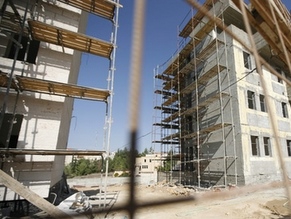|
World Jewish News

A building site in the settlement of Ariel last year. 277 new homes were approved in the town. Photo by: Moti Milrod
|
NY Times: Netanyahu's policy on West Bank settlements is 'national suicide'
06.10.2011, Israel Prime Minister Benjamin Netanyahu's stance regarding continued construction in West Bank settlements is a "national suicide policy," a New York Times op-ed said on Wednesday, adding that Israel's leaders seem to be the country's worst enemy.
In his article, senior New York Times columnist Nicholas D. Kristof criticized Netanyahu for leading a policy that veered Israel away from the path of peace, saying that Israel was endangered most by its leaders and maximalist stance."
"Prime Minister Benjamin Netanyahu is isolating his country, and, to be blunt, his hard line on settlements seems like a national suicide policy, Kristof said.
Referring to continued Israeli West Bank settlement construction, the New York Times article stated that nothing was "more corrosive than Israel’s growth of settlements because they erode hope of a peace agreement in the future."
Kristof also severely criticized Netanyahu's conduct following U.S. President Barack Obama's support of Israel at the United Nations, just as the Palestinians were submitting a bid for statehood.
"At a time when President Obama had a few other things on his plate…the United States frittered good will by threatening to veto the Palestinian statehood that everybody claims to favor," the article said, adding that with "that diplomatic fight at the United Nations under way, Israel last week announced plans for 1,100 new housing units in a part of Jerusalem outside its pre-1967 borders."
"Instead of showing appreciation to President Obama, Mr. Netanyahu thumbed him in the eye," he added.
While the New York Times columnist said that the PM was "far from the only obstacle to peace," citing Hamas' rise in Gaza, he, however added "That’s the saddest thing about the Middle East: hard-liners like Hamas empower hard-liners like Mr. Netanyahu."
"Friends don’t let friends drive drunk — or drive a diplomatic course that leaves their nation veering away from any hope of peace," Kristof concluded, saying that "Today, Israel’s leaders sometimes seem to be that country’s worst enemies, and it’s an act of friendship to point that out."
Haaretz.com
|
|
